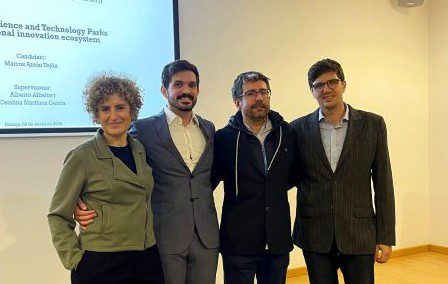Patents from entities located in the state science and technology parks are of higher quality than those from external entities

The doctoral thesis entitled ‘The Role of Science and Technology Parks in the regional innovation ecosystem’ provides empirical evidence on the positive effect of science and technology parks on business innovation
The doctoral thesis entitled ‘The Role of Science and Technology Parks in the regional innovation ecosystem’, written by Marcos Antón Tejón, PhD student at the University of Málaga, has been presented. Its main motivation has been to evaluate science and technology parks as a regional innovation and development policy and to provide new empirical evidence on the positive effect of Spanish science and technology parks.
Among the main results of the thesis are that being located in a Spanish science and technology park has a positive effect on the quality of the patent, with an increase of more than 20% in the number of citations received and of around 7% in the number of years that the patent remains in force. The research also shows that around 12.6% of the park effect on the number of citations is explained by the fact that patents developed in the park are more collaborative, i.e. they have a larger team of inventors and show a greater involvement of universities than patents developed outside the park.
On the other hand, the results of the thesis reveal that the age of the parks shows a U-shaped effect on future patent citations, with younger and older parks having a more positive impact on patent quality. With respect to university promoted and non-university promoted parks, the study finds that both types of parks have a positive impact on patent quality.
The research study also reveals that younger firms benefit more from being located within a park in terms of patent quality due to patent citations, however, when taking into account the size of the firms, it is the larger firms that benefit more from being located in a park in terms of patent quality due to patent renewals.
The thesis also evaluates the effect of science and technology parks from a provincial approach, analysing the effect on firms and entities outside the park boundaries. In this sense, the policy of creating science and technology parks has a positive effect on the patenting activity of the regions, which is revealed mainly in the medium term. Specifically, in years 6-10 after the creation of the park, the effect is about 43% and in years 11-15 the effect grows to about 74%.
The thesis follows the lines of research previously initiated by Alberto Albahari, professor at the University of Málaga, one of the co-directors of this thesis and one of the researchers who has published the most papers on the effectiveness of the activity of science and technology parks.




